| |||||
| Decades: | |||||
|---|---|---|---|---|---|
| See also: | |||||
Events in the year 2009 in Bulgaria .
| |||||
| Decades: | |||||
|---|---|---|---|---|---|
| See also: | |||||
Events in the year 2009 in Bulgaria .

The economy of Bulgaria functions on the principles of the free market, having a large private sector and a smaller public one. Bulgaria is an industrialised high-income country according to the World Bank, and is a member of the European Union (EU), the World Trade Organization (WTO), the Organization for Security and Co-operation in Europe (OSCE) and the Organization of the Black Sea Economic Cooperation (BSEC). The Bulgarian economy has experienced significant growth (538%), starting from $13.15 billion and reaching estimated gross domestic product (GDP) of $86 billion or $203 billion, GDP per capita of $31,148, average gross monthly salary of 1,787 leva, and average net monthly salary of $1,863 (2022). The national currency is the lev, pegged to the euro at a rate of 1.95583 leva for 1 euro. The lev is the strongest and most stable currency in Eastern Europe.
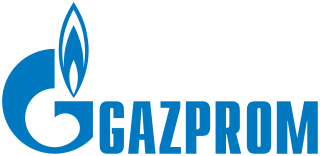
PJSC Gazprom is a Russian majority state-owned multinational energy corporation headquartered in the Lakhta Center in Saint Petersburg. As of 2019, with sales over $120 billion, it was ranked as the largest publicly listed natural gas company in the world and the largest company in Russia by revenue. In the 2020 Forbes Global 2000, Gazprom was ranked as the 32nd largest public company in the world. The Gazprom name is a contraction of the Russian words gazovaya promyshlennost. In January 2022, Gazprom displaced Sberbank from the first place in the list of the largest companies in Russia by market capitalization. In 2023, the company is delisted from international markets, and continues substantial construction in its operational results.

TotalEnergies SE is a French multinational integrated energy and petroleum company founded in 1924 and is one of the seven supermajor oil companies. Its businesses cover the entire oil and gas chain, from crude oil and natural gas exploration and production to power generation, transportation, refining, petroleum product marketing, and international crude oil and product trading. TotalEnergies is also a large-scale chemicals manufacturer.
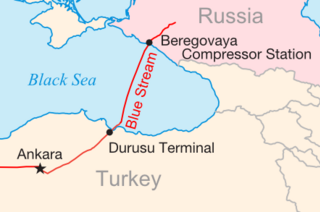
Blue Stream is a major trans-Black Sea gas pipeline that carries natural gas to Turkey from Russia. The pipeline has been constructed by the Blue Stream Pipeline B.V., the Netherlands based joint venture of Russian Gazprom and Italian Eni. The Blue Stream Pipeline B.V. is an owner of the subsea section of pipeline, including Beregovaya compressor station, while Gazprom owns and operates the Russian land section of the pipeline and the Turkish land section is owned and operated by the Turkish energy company BOTAŞ. According to Gazprom the pipeline was built with the intent of diversifying Russian gas delivery routes to Turkey and avoiding third countries.
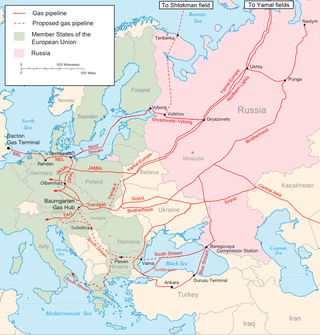
The Russia–Ukraine gas disputes refer to a number of disputes between Ukrainian oil and gas company Naftogaz Ukrayiny and Russian gas supplier Gazprom over natural gas supplies, prices, and debts. These disputes have grown beyond simple business disputes into transnational political issues—involving political leaders from several countries—that threaten natural gas supplies in numerous European countries dependent on natural gas imports from Russian suppliers, which are transported through Ukraine. Russia provides approximately a quarter of the natural gas consumed in the European Union; approximately 80% of those exports travel through pipelines across Ukrainian soil prior to arriving in the EU.
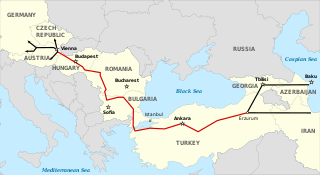
The Nabucco pipeline was a failed natural gas pipeline project from Erzurum, Turkey to Baumgarten an der March, Austria to diversify natural gas suppliers and delivery routes for Europe. The pipeline was to lessen European dependence on Russian energy. The project was backed by several European Union states and the United States and was seen as rival to the Gazprom-Eni South Stream pipeline project. The main supplier was to be Iraq with potential supplies from Azerbaijan, Turkmenistan, and Egypt.

The Burgas–Alexandroupoli pipeline was a proposed oil pipeline project for transportation of Russian and Caspian oil from the Bulgarian Black Sea port of Burgas to the Greek Aegean port of Alexandroupoli. It was seen as an alternative route for Russian oil, bypassing the Bosporus and the Dardanelles. However, in December 2011 the project was suspended by the Bulgarian government due to environmental and supply concerns.

The Yamal–Europe natural gas pipeline is a 4,107-kilometre-long (2,552 mi) pipeline connecting Russian natural gas fields in the Yamal Peninsula and Western Siberia with Poland and Germany, through Belarus.

About 200 TWh of energy in Bulgaria is consumed each year which is about 28 MWh per person, somewhat over the world average of 20 MWh. The largest sources are coal and oil, followed by nuclear.

The Gas Exporting Countries Forum (GECF) is an intergovernmental organization currently comprising 19 Member Countries of the world's leading natural gas producers: Algeria, Bolivia, Egypt, Equatorial Guinea, Iran, Libya, Nigeria, Qatar, Russia, Trinidad and Tobago, Venezuela are members and Angola, Azerbaijan, Iraq, Mozambique, Malaysia, Norway, Peru and the United Arab Emirates are observers. GECF members together control over 71% of the world's natural proven gas reserves, 44% of its marketed production, 53% of the pipeline, and 57% of the liquefied natural gas (LNG) exports across the globe. It is headquartered in Doha, Qatar.

South Stream was a canceled pipeline project to transport natural gas of the Russian Federation through the Black Sea to Bulgaria and through Serbia, Hungary and Slovenia further to Austria. It was never finished.

In 2009, Russian natural gas company Gazprom refused to conclude a supply contract unless Ukrainian gas company Naftogaz paid its accumulating debts for previous gas supplies. The dispute began in the closing weeks of 2008 with a series of failed negotiations, and on January 1, 2009 Russia cut off gas supplies to Ukraine. On January 7 the dispute turned to crisis when all Russian gas flows through Ukraine were halted for 13 days, completely cutting off supplies to Southeastern Europe, most of which depends on Russian gas, and partially to other European countries.

Russia supplies a significant volume of fossil fuels to other European countries. In 2021, it was the largest exporter of oil and natural gas to the European Union, (90%) and 40% of gas consumed in the EU came from Russia.
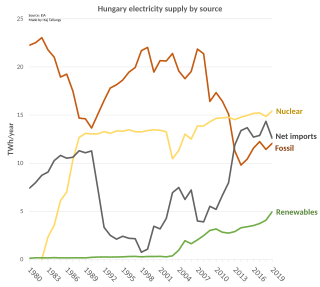
Energy in Hungary describes energy and electricity production, consumption and import in Hungary. Energy policy of Hungary describes the politics of Hungary related to energy.
Gas Interconnector Greece–Bulgaria is a natural gas pipeline from the Greek to the Bulgarian natural gas pipeline network. It became operational on 1 October 2022.

Boyko Metodiev Borisov is a Bulgarian politician who served as the prime minister of Bulgaria from 2009 to 2013, 2014 to 2017, and 2017 to 2021, making him Bulgaria's second-longest serving prime minister to date.
TurkStream is a natural gas pipeline running from Russia to Turkey. It starts from Russkaya compressor station near Anapa in Russia's Krasnodar Region, crossing the Black Sea to the receiving terminal at Kıyıköy.

Fossil gas supplies over a quarter of Turkey's energy. The country consumes 50 to 60 billion cubic metres of this natural gas each year, nearly all of which is imported. A large gas field in the Black Sea is however forecast to start production in 2023.
Events in the year 2022 in Bulgaria.

The Russia–EU gas dispute flared up in March 2022 following the invasion of Ukraine in late February. Russia and the major EU countries clashed over the issue of payment for pipeline natural gas exported to Europe by Russia's Gazprom. In June, Russia cut the flow of gas by more than half, in July it stopped and resumed it, and in September it stopped it altogether. On 26 September 2022, the Nord Stream 1 and 2 gas pipelines both ruptured with evidence of sabotage.